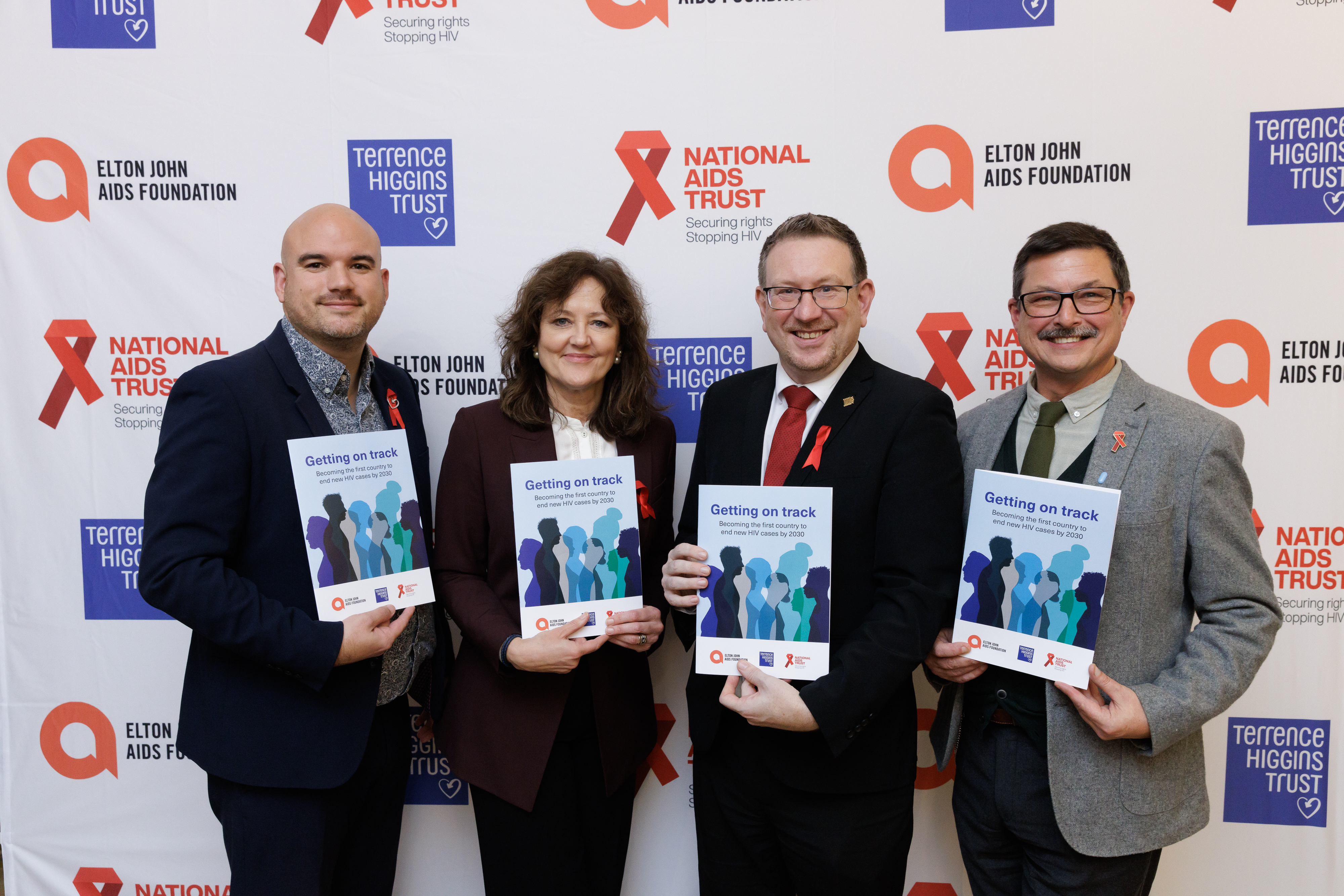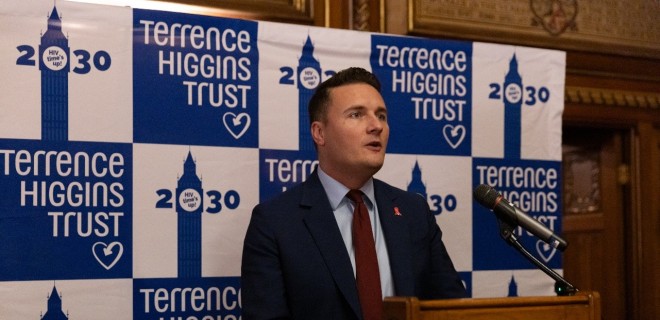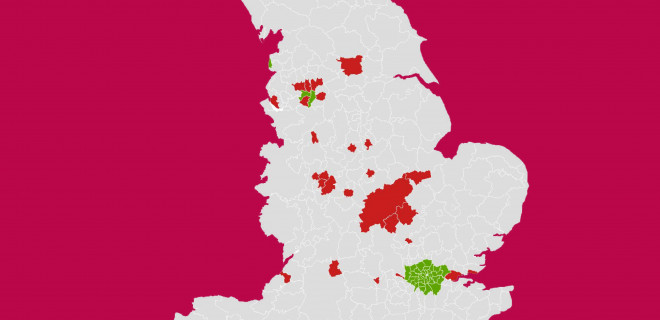
Thank you very much for that introduction, and I want to say from the outset how grateful I am to the National AIDS Trust, the Elton John AIDS Foundation, and the Terrence Higgins Trust for this excellent report.
Now, look, I've been a minister now for, I think, 139 days. So in political parlance, I'm told that's about three Liz Truss’s —not a very long time at all. But not a day goes by that I don't thank my lucky stars for campaigners like all of you in the room.
You make the government walk the walk on prevention. You make us live up to our promises, and you rightly push us to go further. That's what campaigners are doing. And anyone who doubts that you can make a difference should take one look at how far LGBT+ rights have come.
And that's just one example out of many of the achievements made by dedicated and selfless campaigners and activists like yourselves—overturning outdated laws that discriminated against people living with HIV, bans on military service, blood donation, and access to fertility treatment.
In fact, just last month, I was so proud to be the minister that changed the Human Fertilisation and Embryology Act to allow people living with HIV to donate sperm, eggs, and embryos to their friends and relatives. It also made the system fairer for female same-sex couples who are trying to conceive.
We listened to the campaigners—some of them are in this room—and you told us that the law wasn’t fit for purpose. We worked with you to change it, and that was the right thing to do.
But let me make this clear: because four months ago, when I first became the Minister of Public Health, walking through the doors of the DHSC, I felt, as I do every single day I walk through those doors at the department, a profound sense of purpose.
Not just because I want to repay the trust of the Prime Minister and the public who put me there, but also because I represent a town called Denton, where I grew up. The Greater Manchester region is host to some of the biggest health inequalities in our country.
So every time I go back to Denton, it reminds me of what I’m in Westminster and Whitehall to do. My job is to do everything I can to eradicate health inequalities in every community that they exist.
And I know that in this fight, I have no greater allies than the people in this room. Because if there's one thing I've learned from observing and learning about the history of rights, struggles in this country, it's that this community knows, deep in its bones, that all of our struggles are interlinked.
Just look at how campaigners in the 1980s travelled to Wales to show solidarity in the miners’ strike, and how they’ve been at the forefront of taking on racism. That sense of community, that desire to be united, means that no one can be left behind in our mission to end the transmission of HIV in England.
Undoubtedly, this mission includes people from all walks of life, including all sexual orientations, races, religions, and genders. These communities know that health inequality is a disease, and deprivation hurts us all. None of us are free until all of us are free. None of us are safe until all of us are safe. And none of us are equal until all of us are equal.
So here you are, continuing the great tradition of activism. And I will work with every one of you in this room as partners in progress to deliver our new action plan.
Because six weeks ago—I see they’re taking note of how long I’ve been here and when it was that I made these announcements—six weeks ago, I outlined the shape our plan was taking. I spoke about how we would stop treating PrEP like it's a specialist medicine that's only for gay men and can only be accessed through specialist clinics. How we’re looking into building in opt-out testing and making testing routine across the NHS. And action on the quiet crisis of people who are diagnosed with HIV but not accessing those life-saving treatments.
And for the avoidance of doubt, let me repeat the promise I made then: we will publish the plan by the summer of next year.
But as I said, we don't just want this to be drafted by a few bureaucrats—important though they are, and I have the greatest respect for them, particularly the ones I’ve brought with me. But this is a dialogue and a conversation.
And that’s why I welcome this report, and I want to address its warning head-on: that we are not on track to reach the 2030 goal to end new cases of HIV in England.
I won’t beat around the bush here. We have inherited a health system that is broken. Sexual health services are under immense strain. There are months-long waiting lists to get on PrEP, and 14,000 people living with diagnosed HIV are not accessing care.
People living with HIV have a poorer quality of life in every available metric compared to the general population. This is unacceptable. It must change, and it will change.
So let's look at the six points in the report.
Firstly, on leadership, you're right to say this should be the responsibility of every part of the Health Service. We are all in this together, and I absolutely agree NHS England needs to be active participants in our action plan. That's why they're represented on our HIV Steering group, and they will be involved every step of the way.
On testing, I agree this is extremely important. It's ultimately the only way we'll address the quiet crisis of people who are diagnosed with HIV but not accessing life-saving treatment. HIV testing campaigns and initiatives like the national HIV testing week have been a massive success, but they've cast a very wide net. We now need to tailor our approach to reach those people living with undiagnosed HIV who have slipped through that netting.
Now, local authorities are responsible for testing and prevention, and I know how local authorities tick. I was a councillor for years before I became an MP. I meet with councillor all the time as a minister. I live with a councillor, incidentally, and I will work with them to make sure they're putting HIV prevention at the top of the local agenda.
Third, expanding opt-out testing to other parts of the NHS. So opt-out testing has been a huge success. On Thursday, the UK Health Security Agency will publish a report that will give us all the latest data, and we'll use this as a springboard to see where we can go further.
Fourth, on PrEP, we've heard from our PrEP access and Equity Task and Finish group who've gathered the evidence to understand why some population groups are underrepresented and identified potential barriers to access. They've offered some vital recommendations to improve equity and access for PrEP for key groups, which have been reflected in the PrEP roadmap. This roadmap will guide our new action plan every step of the way because, as numbers tend to zero, we must work together to reach those communities who have not been captured so far.
One of my bugbears—I've gone off script now—but one of my bugbears as a minister is when we talk about hard-to-reach communities. Let me make it clear: there's no hard-to-reach community in England. We've just got to try harder to reach some communities more than others, and that's precisely what I am determined we do with our new action plan.
Which leads me onto fifth, retention and re-engagement. I absolutely agree that everyone living with diagnosed HIV should have the support they need to access care, and our Retention and Re-engagement in Care Task and Finish group will continue looking at how we can increase the number of people retained, re-engaged, and receiving effective treatment as part of the new HIV action plan.
Sixth, on stigma, six weeks ago I said that one person getting verbally harassed was one too many. I stand by that. It's absolutely right, but smashing the stigma isn't just the right thing to do—it's also good policy. We need to break down every single barrier that exists to accessing care.
This year, we backed HIV Prevention England's HIV Stigma Symposium in March, bringing together around 100 community experts, activists, healthcare professionals, and people living with HIV to discuss the impact of stigma. We'll build on that by working with UKHSA who monitor stigma data through the Positive Voices survey report. Believe me when I tell you, stigma will be at the front and centre of our action plan, and as such, we must not be divided in our approach.
Achieving this goal demands collaboration, and that is why our dialogue with the voluntary and community sector will continue throughout the development of this plan.
Now, in Martin Luther King's last speech, he said, "I've been to the mountaintop, and I've seen the promised land that lies ahead." We're getting to that promised land—a country with zero transmission where no one suffers from discrimination and abuse. For me, that's not just a dream. Everyone in this room, every single one of you, is making this a reality. Zero transmissions is our aim. A better, fairer country for all will be the outcome.
Let's go and get there together. Thank you very much.



